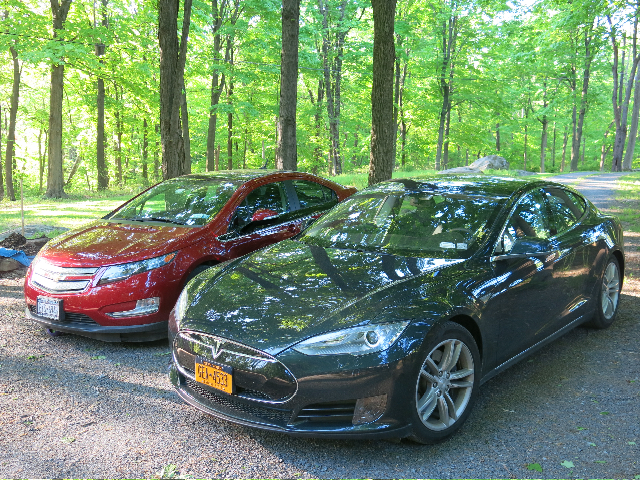
The Chevrolet Volt and Tesla Model S have jockeyed for the Canadian sales crown since the latter's arrival in Canada.
October marked the 20th consecutive month that either the Chevy Volt or the Tesla Model S was the top-selling Canadian plug-in electric vehicle. In the 10 months for which we have Tesla Model S registration data, it's taken the crown four times.
If the Model S proves to have beaten the Volt in October, it will move into a tie with the Nissan Leaf for number of months atop the Canadian plug-in sales charts, which break down as follows:
- Chevy Volt: 17 months (or 18 months, if it wins October)
- Nissan Leaf: 5 months (including 2 months as the sole electric car on the market)
- Tesla Model S: 4 months (or 5 months, if it wins October)
- Mitsubishi i-MiEV: 1 month
- Toyota Prius Plug-in Hybrid (your author's beloved car): 0 months
Model S and Volt
Last month, we used a triple-qualifier to suggest that the Volt may have edged the Model S in September sales – only to be proven wrong by the vehicle registration data, which put the Tesla ahead, 64 to 59.
Given that the Volt sold 62 units in October, we'll cautiously suggest that the Model S will remain atop the sales list, when the registration data comes in.

Plug-in electric car sales in Canada, Oct 2013
Though Elon Musk recently claimed Tesla may have to "starve" North American customers as the company broadens its push into Europe, we don't want to make the mistake of underestimating Tesla Motors for a second consecutive month.
The Volt's 62 sales are in line with its monthly average this calendar year (63/month) if we ignore the exceptional 153-unit month of June. Sales are about one-third lower on a year-to-date basis, as Chevy sold more than 100 Volts in six different months last year.
Leaf, i-MiEV, Prius Plug-in
Nissan moved a modest 30 Leafs off the lots in October, down slightly from September, and slightly below the year-to-date average of 41 monthly sales.
We wonder if sales will dip in November and December, as Nissan Canada was allotted a very low volume of the 2013 model-year vehicle, and the 2014 model-year Leaf apparently won't arrive until January, accompanied by a further $1,000 price reduction.
The Mitsubishi i-MiEV limped along with another 12 sales in October. Year-to-date sales are at 160, versus 175 at this point last year.
For the second month in a row, the Prius Plug-in sold an anemic, worst-ever 7 units across Canada – in the same month the vehicle topped the American plug-in sales charts.
A good point of reference might be that in October the Prius Plug-in sold about 5 percent as many vehicles as its hybrid counterpart in Canada (7 vs 143), but about 25 percent in the United States (2095 vs 8239).
Non-reporters
Examining the vehicle registration data, we see that Canada received its first four Chevy Spark EVs in September, leapfrogging the vehicle past the suddenly-slumping Smart Electric Drive's 3 deliveries.
The Spark EV remains a fleet-only car, however; retail buyers cannot purchase the electric minicar.
The Ford Focus Electric beat both minicars, with 12 sales in September, meaning it outsold the Prius Plug-in as well. Given the slowdown in Prius Plug-in sales in Canada, Ford's stable of three plug-in vehicles seems a safe bet to outsell Toyota's plug-in offerings, this year.
Dealers also moved one more Fisker Karma off the lots.
Overall market
Canadian plug-in electric car sales have increased by roughly half this year. Factoring in probable October sales for models where only vehicle registration is available, total sales are around the 2,400 mark, up from about 1,600 at this point last year.
The province of Quebec's Transportation Electrification strategy should accelerate sales in Canada's most electric-vehicle friendly province. The Nissan Leaf Facebook Group also claims that five DC quick-charging stations now link Montreal and Quebec City, the province's two biggest cities.
In related news, Ontario followed with amendments to its Electric Vehicle Incentive Program to better accommodate the needs of vehicle fleet operators, and British Columbia announced that six of its thirteen quick chargers in its provincial network had come online.
_______________________________________________











